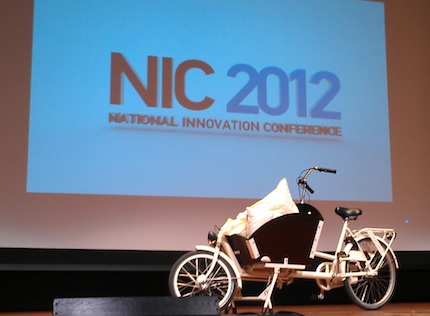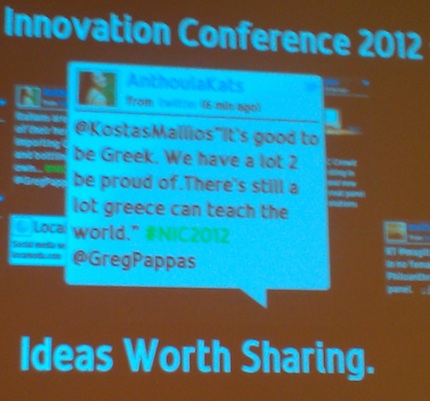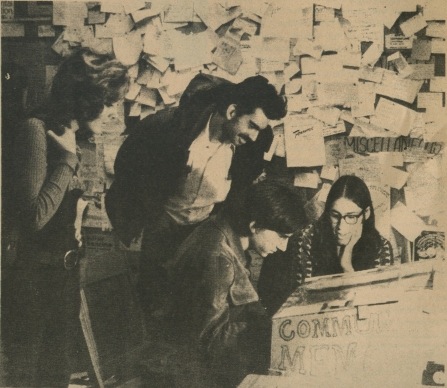The speakers at NIC 2012 – The National Innovation Conference today were truly inspirational.
About The Conference: The NIC 2012 conference IS a living community of inspired, successful and unique people who believe in Greece and the potential of Greeks. Every person at this conference is at the center of a community, a parea, a unique network that has tremendous vitality. For an example of a very dynamic slice of those present, check out the 40 Under 40, an esteemed list of young Greek leaders in North America who have excelled in their respective business endeavors and who simultaneously strive to make the world around them a better place through community involvement, philanthropy and/or volunteerism. WHEN such networks are activated fully, Greece truly will realize itself, to quote Peter Economides, as the “apple of the Mediterranean.”
George M. Logothetis, Head of the Libra Group, stood out as a leader that could very well take the helm of Greece itself. He said, “Greece is an ancient society that has overcome many difficulties. Greece just needs the ceiling of negativity and cynicism to be lifted. Let us talk about what Greece can be.” The house filled with applause at this statement by Mr. Logothetis. He went on to quote his grandfather, who said, “The impossible I can do. It is miracles that will take a little longer.”
Paul Efmorfidis, founder of Coco-Mat Beds, encouraged the audience to “Look around you. What is around you? Work with that.” Mr. Efmorfidis went on to speak of a good business, a business that can say, “We are proud of what we are doing. Our doors are open. We do not have secrets.” Efmorfidis also insisted that “we have to be alert in this life…we have to be awake.”
THE PHILANTHROPRENEURISM PANEL: A panel discussed Philanthropreneurism, focusing on how Greeks can use entrepreneurship and new technology for the benefit of Greece. The panel included Basil Mossaidis, Director of Ahepa; Endy Zemenides, Exec. Director of Hellenic American Leadership Council; Emanuel Manoussakis, Co-Founder & CEO of Groopio.com; John Pyrovolakis, Exec. Director of Innovation Accelerator; Loukas Pilitsis, CEO of Piraeus Equity Partners at Piraeus Bank; and Kostas Mallios, VP, Intellectual Ventures.
QUOTES AND THEMES FROM THE PHILANTHROPRENEURISM PANEL:
“Think positive and be realistic.”
“Make sure creativity does not get lost during the process of setting up a new business.”
“Young professionals in Greece are choosing to live with family or groups of friends and become entrepreneurs vs. working for increasingly low wages or jobs where pay never arrives.”
“Social networks are in the DNA of Greeks.”
“Mentorship of young entrepreneurs in Greece is crucial.”
“One of the most actionable steps in the short term: familiarize young Greeks with how to connect with funding and wealth.”
“We are living a technological revolution in Greece.”
“The Israeli innovation model is what applies in Greece.”
“We need a true innovation eco-system in Greece.”
“Israelis push for leaders, they cultivate leaders, they push young leaders. This is the model we must also choose.”
“We must find leading students and teach them, involve them in internships, mentor them.”
“We must train and cultivate young Greek leaders here in America and then send them back to Greece.”
“The private sector should lead Greece.”
“We must have successful private sector leaders actively participating in hand-holding and mentoring. We must leave the State out of this.”
“In 1974, when Cypriots lost everything, Greek-Cypriots came and rallied and brought Cyprus back to health.”
“The path to integrity is through the crisis itself. This is not just a financial crisis. This is also a social crisis. The crisis itself will create honesty and integrity.”
“Corruption has happened because it can. When corruption cannot happen, then changes will happen.”
“Greece has hit rock-bottom. There is nowhere to go but up.”
“We must get those in need of menthorship in touch with mentors. Social networks can do this.”
Stefanos Sitaras (http://www.stefanossitaras.com/), a film director and super creative thinker, asked, “How do you learn to take a crisis and become a better person through it? The mechanism of doing this is like an elevator that takes you to the very bottom where you hear negative voices and you really feel and experience the crisis within your body. And then you sacrifice all of this fear, timidness and pain. You give it up. And you eliminate your dependance. And you see who you are and rise to your best self.”
Arianna Huffington (who joined by video), said that all humans must learn to “Stop looking for the victor on the white horse to arrive and start looking at the victor in the mirror.”
Peter Economides, founder of FelixBNI, closed the conference with THE riveting and exact presentation on ReBranding Greece that has won hearts and minds the world over. He praised Athens as the city that “inspires love” and as “the most inspiring place on the planet.” Mr. Economides emphasized how “brand are a set of impressions inside of our heads…brands push the human race forward.” He insisted that Greece IS “the apple of the Mediterranean” and that it is up to Greeks to nurture this beautiful reality. Economides’ rooted his talk in the truth that “everything communicates” and that it is up to Greeks to nurture, guide and create the Greece that will be victorious.
Leda Karabela (http://yhesitate.com/) led a powerful session after Mr. Economides’ talk, in which she asked the audience to state words that captured their feelings, voice plans that could be driven by these feelings and make vocal commitments that would bring these plans to fruition. The audience fully participated with many voices chiming in and contributing to a rich close to the conference. The hall outside afterwards buzzed with conversation as networking and introductions ensued.
One could definitely say that Gregory Pappas and the Greek America Foundation put on a truly successful event, which we hope will contribute a significant slice of human capital to the growing support for Greece worldwide.





